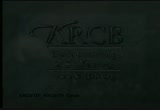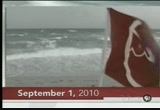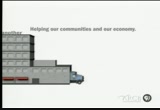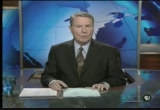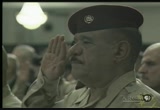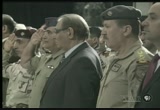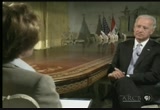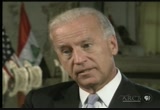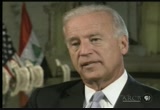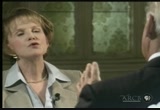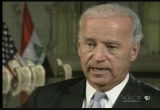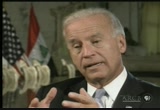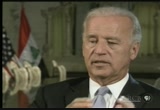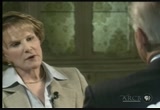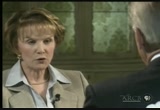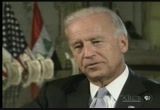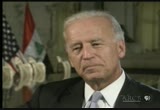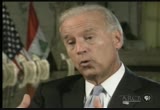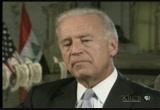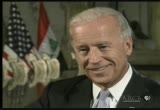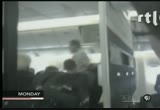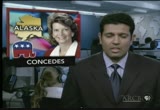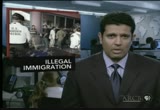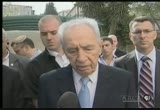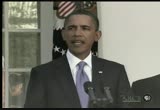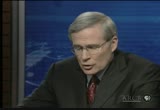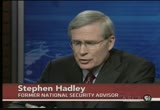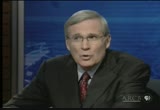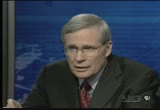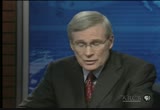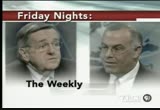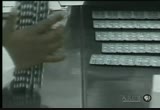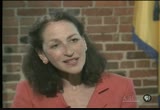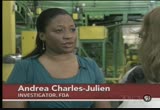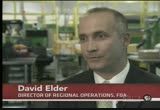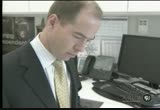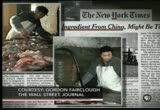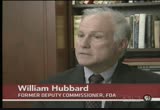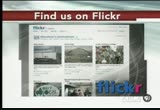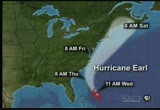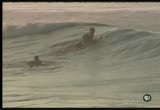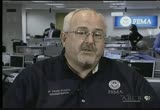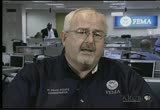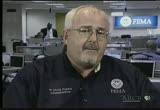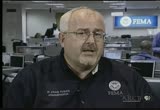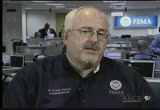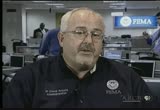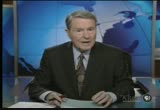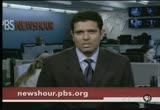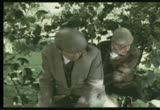tv PBS News Hour PBS September 1, 2010 5:30pm-6:30pm PDT
5:30 pm
captioning sponsored by macneil/lehrer productions >> lehrer: evening. i'm jim lehrer. the united states today began what is now called "operation new dawn." the post-combat era in iraq. >> ifill: and i'm gwen ifill, on the newshour tonight, war war in bagged talks to ript biden about the change in mission >> only time scess will be able to be declared is when the iraqis form a government, and several years from now they're in a position to maintain their own security, not a threat to their neighbors, and their economy is growing and prospering. >> lehrer: then former secretary of state madeleine albright, and former national
5:31 pm
security adviser steven hadley, says the effort to jump start the middle east process. >> ifill: betty ann bowser looks at how vast quantitys of imported pharmaceuticals and food are straining the federal drug administration's safety net. >> many of the laws that created the f.d.a. are the same laws that we're operating under today, and at one time, they were fittinging and appropriate, but the worlt has changed a lot. >> lehrer: and fema administrator, craig fugate, updates emergency preparations as hurricane earl approaches the east coast. that's all ahead on tonight's newshour. major funding for the pbs newshour has been provided by: >> i want to be the first to cure cancer.
5:32 pm
5:33 pm
and with the ongoing support of these institutions and foundations. and... this program was made possible by the corporation for public broadcasting. and by contributions to your pbs station from viewers like you. thank you. >> lehrer: the u.s. moved into what is planned as its final military phase in iraq today after ending its combat role. newshour correspondent kwame holman begins our coverage. >> reporter: cleaning up and packing-- that's what u.s. soldiers were doing on bases across iraq today. humvees rolled on to flatbed trucks and rows of equipment awaited transport home. last night, president obama marked the formal end of
5:34 pm
combat operations in iraq with a speech from the oval office. >> our combat mission is ending, but our commitment to iraq's future is not. this new approach reflects our long-term partnership with iraq , one based upon mutual interest and mutual respect. >> reporter: today, american military leaders marked the occasion with a change in command of the remaining 50,000 troops in iraq. vice president biden and defense secretary gates were among those presiding at the main u.s. military headquarters on the outskirts of baghdad. >> i pray that all those scarred by this war in iraq come to know the bond of lasting peace, and i believe, i truly believe that their darkest days are now behind them. they have such a great opportunity as they step up to it. >> reporter: defense secretary gates also visited american troops at camp ramadi. he said only history will be the judge of whether the war
5:35 pm
was worth it. >> our men and women in uniform believe we have accomplished something that makes the sacrifice and the bloodshed not to have been in vain, that we have accomplished -- that our men and women in uniform have accomplished something really quite extraordinary here . how-- how it all weighs in the balance over time i think remains to be seen. >> reporter: for their part, iraqi military leaders reiterated that they are ready to take the lead on security. iraqi security forces already have been tested by a rise in attacks. even those civil van deaths dropped in august, according to new data from the health ministry. but on the streets of baghdad today, some iraqis expressed real fear about what the future holds. >> ( translated ): iraq is a country without government and sovereignty. it is now an easy morsel
5:36 pm
that any state can occupy, and if the american troops withdraw, iran will enter. >> ( translated ): i hope that the american troops would leave iraqi, but not right now. >> reporter: the deadline for all u.s. troops to withdraw from iraq is the end of 2011. >> lehrer: shortly before the change of command ceremony, margaret warner spoke with vice president biden. they met in a building north of baghdad that used to be saddam hussein' hunting lodge. >> mr. vice president, thank you for having us. >> happy to be with you, margaret. i really am. >> reporter: last night president obama said we have met our responsibility in iraq. we've been here a while. a lot of iraqis say to you, "you haven't. you came to our country, dictatorship, but at least we had services and we had security. now we don't have either." what do you say to them? i mean have we met our responsibility? >> the vast majority of iraqis i speak to acknowledge there is a great deal more security than there ever has been since the beginning of the war,
5:37 pm
number one. number two, the president said we have met our combat responsibilities, he means by that we have trained up 650,000 iraqi forces, and i might add, crack special forces, who really can do the job. but the president also pointed out that this is just the beginning of our engagement with iraq. we are ramping up our diplomatic and civilian engagement. we want to participate in helping them develop an economy. they have great human capital. they have great natural resource. this is far from finished, far from finished, but there has been progress. >> reporter: now when the president says the combat missions is over, the brigades-- they're combat brigrades, they just have a new name. >> they're 50,000 troops that can shoot straight if they have to, god willing, and some of those troops are going to be going out on counter-terrorism efforts, mentoring the iraqis but what can means is the
5:38 pm
lead responsibility for the combat missions will be handed over and has been, quite frankly , as general ordeano points out, it's been handed over for months. >> reporter: but more american servicemen and women are going to die here. >> well, it's a heck of a wait to put it, but there are still going to be 50,000 american men and women here and this is a country where we're at risk, randomly at risk. you have seen the recent bombings that have taken place. i don't know, the statistic is not comforting to people, that on average 12 events kill three people each event, and that's not comforting to their families. it's still difficult but it's nowhere near what it was before and the iraqis are now positioned, are now positioned to begin to take over the totality of their security needs. we're on course to meet president bush's commitment
5:39 pm
to withdraw all troops by the end of 2011. >> reporter: on the question, as y said, thettacks have been on the uptick in the last couple of months. do you consider that a temporary blip around ramadan, around this handover, or could it continue to escalate? >> i do think it's a temporary blip. and, again, put it in focus-- it's still lower than it ever has been, even though there has been an uptick. it tyke long time for al qaeda and the extremist groups to plan that last coordinated effort, which in a broad sense -- >> reporter: are you talking about the one last wednesday? >> yes. >> reporter: where about 50 or 60 iraqi vifl yapz died. >> yes. >> reporter: but when you say things are better or safer, what's your benchmark? are you talking about the dark district attorneys of '06 '0 sait. no six months ago, eight months ago, 12 months ago. >> iraqis at a to us to use as a benchmark the dark days of when they came out of
5:40 pm
their houses in the morning and there could be dozens of people literally in the street, people had holes drilled through their head with power drills. that is not normal life. >> that is not what we're comparing it to. we're making a comparison, this is a much more functioning society. the bazaars are open. there are still people who occasionally get killed. it's still, in many cases, a dangerous place but the vast majority of this country is not today people-- people aren't walking out their front door thinking it's probable i may find myself in a situation where i may get blown up. that's changed. >> reporter: not probable, but possible. >> possible, it is possible. this is still a dangerous part of the world. there are still people who are willing to strap a bomb to themselves, and blow somebody else up. >> reporter: here's another thing we hear from iraqis-- they blame this upsurge in violence on the politicians' failure, six months after they all went to the polls to vote, the politician'
5:41 pm
failure to form a government. do you think there is a connection? >> look, if i were an an iraqi, that's what i would think as well. the truth of the matter is they're taking too long to form this government. but the second piece of this is the iraqis went and voted. but guess what? no-- not only no clear majority, barely a plurality. so in parliamentary systems, this is not unexpected, but i am confident that they are now, all have run the course of what other options they have, and it's getting down to the point where in the-- in the next couple of months, there's going to be a government. the only thing i have said in the name of the president and as it relates to this government, the government has to reflect the outcome of the election. which is another way of saying, all the four major entities that did relatively well have to be included in the government. that's a difficult thing to put together. >> reporter: so would it be unacceptable to the united states for the scenario that
5:42 pm
we're told iran is pushing very hard, which is to have maliki's party team up with the more religious shiite parties and exclude, in fact, the party that won the most seats, which has been sunni backed, the party of doctor alalli. >> it is not for the iraqi people a formula that allows them to realize the potential if anyone kb one of the major parties are left out. in my view, in our view, you cannot have a government that is likely to succeed if all of the sunnies are shut out. that would be a mistake. and, look, there's been a lot of speculation with regard to iran-- first of all, iran invested $100 million to try to influence the outcome of this election. it didn't go very far, number one. number two, iran has tried several gambits about how to go forward. i think what iran is basically doing is trying to figure out what
5:43 pm
the most likely outcome is and embrace it so they say they didn't lose. but i don't think there can be a government that is going to reflect-- going to have the support of the people of the iraqi unless it includes the sunnis as a major player. >> do you think there would be hell to pay in the streets if, in fact, that were to happen? >> i think it would increase exponentially, the difficulty of unifying this country long term, if in fact, any one of the major parties were left out. >> reporter: president obama said in his radio address by the end of next year, all troops will be coming home. >> yes. >> reporter : now , this new government says we'd like to talk about a more longer term arrangement and keeping some u.s. troops here as a sort of guarantor, are you saying a nonstarter? >> negotiate we're not saying that. we're saying we're going to keep the commitment we made, that george bush made, president bush made to the iraqi people and to the then-government of iraq.
5:44 pm
and by the way, every single poll that's been conducted in this country says two-thirds plus very much want america to keep that commitment and than to totally leave. let's important people get that straight because i turn on the news and hear, "the iraqi people really want americans to say they think they're being abandoned. two-thirds want us to leave. they still want a relationship and a partnership with us, but they want to claim their own sovereign ability to secure themselves. >> reporter: but you're not saying that the obama administration would absolutely refuse if six months from now, a new iraqi government said it would be helpful for us to-- >> it would be highly unlikely that we would even consider the idea of maintaining 50,000 troops indefinitely here in iraq. but we have committed and we will keep the commitment to the iraqi people and the government that all troops will be out by the end of next year. if they come forward and say, "we don't want you to do that. we want to you leave some
5:45 pm
troops to help us on a specific item," we'd, obviously, consider that. >> reporter: now, president obama noted last night he was keeping his campaign pledge. >> yes. >> reporter: what kind of credit do you expect voters to give your administration and the democrats in november on this point, that you're getting out of iraq, as you said you would? >> i'm going to give you an answer that's going to sound like what you'd expect, but it happens to be true. i don't think that-- the only credit the president deserves is that he keeps his word. the real credit goes to the people-- we've had more than a million forces that have rolled through this country . over 4,000 fallen angels in this country . you know, thousands upon thousands wounded. i mean, when my son came home after a year of being here, i felt so grateful and in a sense so guilty that he came home , thank god, completely intact after a year here,
5:46 pm
and all i could think of was-- i really mean this sincerely-- all i could think of was the funerals i've gone to before and since of those families waiting for people to come home. theatre people when deserve all the credit. >> reporter: but in the credit department, as you know, the republicans and john bain ethe house minority leader said just last week,ou and president obama are claiming credit for this milestone. the real credit goes to president bush's surge of troops which helped bring some kind of security here and you're just unwilling to knowledge that. does he have a point? >> that is simply not true. the president's speech acknowledged president bush's contribution. >> but not the surge. >> look, look. if you really go back and take a look at this you could argue the surge made possible what was the most significant thing that occurred which was a political transition where we put over 100,000 sunnis on the payroll. that was-- >> the sons of iraq. >> the sons of iraq, that
5:47 pm
was the first political-- and general petraeus deserves a lot of credit and the last administration. look, there's no question we had serious disagreement with the way this war began , the way it was initially conducted. and that's-- that's-- that's just the fact. but the truth of the matter is, everyone from the beginning said-- including the members of the last defense department-- said that, look, the only solution is a political solution. and that political solution did not really begin until the sons of iraq , the sunnis, were pulled away from -- >> al qaeda. >> al qaeda. and so-- but, again, i think litigating all this, it's time to just move on. first of all, -- >> reporter: but you aren't acknowledging that the surge made this possible. >> look, i said at the time, i didn't have any doubt at all that the surge met its military objective, but that
5:48 pm
would be hollow absent a fundamental change in the political dynamic here. up to that point, the administration is saying they want a very strong government in baghdad . they were going to have this centralized and tight , when, in fact, look where we are. we have a very different situation in kurdistan, we have a very different situation in anbar province now, and now they're moving together and sharing power. so i don't want to arg-- if john boehner or anybody else wants to say the surge did this, fine, fine. the fact of the matter swe're not there yet. we're making significant progress. the only time success had been able to be declared is when the iraqis form a government and several years from now they're in a position to maintain their own security, they're not a threat to hir neighbors and-- their neighbors and their economy is growing and prospering. that's when everyone can say it's a success. >> reporter: final question-- what should the voters take from this about
5:49 pm
the depth and the firmness of the president's commitment in afghanistan to start drawing down troops in july? >> they should take him at his word, take him at his word. and here's what we said-- we will begin to transition in july of 2011. responsibility to the afghanis and that will be conditions-based on how quickly that transition takes place. but, look, an unbending war is not a policy. a policy rests upon, ultimately, the afghani government wanting pea and security more than we even want it. we can't want it more than they do. and they're going to have to step up. but transition will begin as general petraeus has said, as the president has said, in july of next year. >> reporter: mr. vice
5:50 pm
president, thank you stoch. >> it was my pleasure. thanks for having me. >> ifill: still to come on the newshour, talking peace in the middle east. keeping our foods and drugs safe. and preparing for a hurricane earl. first here is hari sreenivsan in our newsroom. >> sreenivasan: bombser to into crowd of shiite muslims in lahore, pakistan today. at least 25 people were killed. and 150 others were wounded. a camera captured the first explosion. a timed bomb that went off amid 35,000 people in a religious procession. two suicide bombers blew themselves up mntsd later. the shiites erupted in anger, hammeringing on vehicles and setting fires. they suffered a series of receipt attacks. the u.s. justice department has filed criminal charges against the leader of the pakistani taliban. he remains at large, accused of attacks on americans and afghanistan including a bombing that killed seven c.i.a. employees
5:51 pm
last year. another u.s. soldier was killed in afghanistan today. he was the first american to die there in september, and the 20th in the last five days. nato officials also reported today that more than 500 saerjs were detained in august and 160 were killed. in the netherlands, two yemeni men who arrived from the u.s. this week were freed without charge. ahmed mohammed nasser al-soofi and hezam al-murisi had been suspected of plotting to attack airliners. they were detained monday when their flight from chicago landed in amsterdam. al-soofi's luggage contained a phone taped it a plastic bottle and another phone taped together and he had $7,000 in cash. today, dutch prosecutors announced there was no evidence of any wrongdoing and al-soofi's lawyer said his client is innocent. >> i cannot go into detail what my client has said to the police. we respect the agreements we have with the district attorney, but there is one
5:52 pm
thing i want to say on his behalf, his statement. "i do not have any connections with terrorist organizations whatsoever." >> sreenivasan: there was no immediate word where the men will go following their release. republican senator lisa murkowski of alaska will not be serving another term in washington. she concede defeat last night to primary opponent joe miller, a little-known conservative lawyer. he was backed by tea party activives and by former alaskian governor sarah palin. she is the third u.s. senator to lose a renomination bid this year. wall street start off with a major rally sparked by upbeat reports on manufacturing in the u.s. and china. the dow jones industrial average gained more than 254 points to close at 10269069. the nasdaq rose 52 points. august may have the worst month for
5:53 pm
u.s. auto sales in 27 years. general motors, ford, and toyota reported today that sales fell from july . so did most other auto makers doing business in the u.s. the sole exception was chrysler. it reported a gain of 7%. the number of unauthorized immigrants in the u.s. has fallen for the first time in nearly 20 years. the pew hispanic center reported today that there were just over 11 million undocument individuals. that is a million less than last year. it coincided with the economic downturn and stepped up border enforcement according to pew, unauthorized immigrants still make up 4% of the u.s. population. those are some of the day's major stories. now gak to gwen. >> ifill: israeli and pal leaders return to washington once again in search of common ground. there was talk of peace in washington today, but renewed violence in the middle east. hundreds of people gather ed
5:54 pm
on the west bank. four israeli settlers were shot dead yesterday by palestinnian gunmen. the attackers sprayed the settlers' car with automatic,s fire outside hebron, killing everyone inside. the militant group hamas, which controlled gaza, claimed responsibility. it was seen as a deliberate attempt to sabotage the washington peace talks. both israel and the palestinnian authority which governs the west bank said the attack would not derail their peace effort. israeli president and former prime minister shimon peres... >> none of us has the slift intention in mind to submit to this threat . we shall continue to negotiate, we shall overcome the terrorists. >> ifill: the pal stainian authority responded by rounding up 150 activists on the west bank today. >> ( translated ): these arrests came for security reasons and what hamas did
5:55 pm
was against the peace process and aimed to kill the last glimmer of home hope for the palestinnian people. >> ifill: but hamas supporters in gaz celebrated, and the hebron attacks, plus a shooting today that wounded two israelis, cast a pall over initial white house meetings. president obama met with israeli prime minister benjamin netanyahu . >> the message should go out to hamas and everybody else who is taking credit for these heinous crimes that this is not going to stop us from not only insuring a secure israel but also securing a longer lasting peace in which people throughout the region can take a different course. >> the president's statement is an expression of our desire to fight against this terror, and the talks that we had, kmrp, indeed, open, productive, serious in the quest for peace
5:56 pm
also centered around the need to have security arrangements that are able to roll back this kind of terror and other threats to israel's security. >> ifill: the president also met with abbas. >> benjamin netanyahu and president abbas are two people who i believe want piece. both believe these negotiation can be completed in one year. as i told each of them today, this moment of opportunity may not soon come again. they cannot afford to let it slip away. >> ifill: the formal talks begin at the state department tomorrow. also joining will be king abdullah of jordan and presidenmubarak ofgypt. were jned by two people who have been at the table before, former secretary of state madeleine albright, helped organize the camp david summit between ehud barak and palestinnian
5:57 pm
authority chairman yasser arafat in 2000, and steven hadley was president bush's national security advisor when he helped plan the 2007 annapolis conference bringing together ehud omart. what about this meeting, if anything, makes it different from the past? >> well, i think it's a very important meeting, and what makes it dinner is that i think this is a great moment of opportunity because both of leaders, as the president just said, seem to have a very reasoned time to come here at this particular moment. things have deteriorated in many ways. and i think that they see this as an opportunity with the united states really getting them together. i think it is really important that president obama, secretary clinton, senator mitchell have really made it ve cle that is it is the role of the united
5:58 pm
states to bring the parties together, but that they are the ones who have to make the decisions. so i think it is-- i'm optimistic about it. i am an optimist who worries a lot, but i do think that this is an important moment. >> ifill : mr. hadley, are you optimistic? is this picking up from where you left off? >> well, there's a lot of skepticism out there. i don't know, we've had, through two decades of violence, recriminations, a couple of failed ocesses that came close, so there's a lot of skepticism out there. but i think there is ground to be hopeful. i think one of the things that is important is what is happening on the west bank with president abbas and the prime minister building now the institutions for a palestinnian state, taking responsibility for security. the israelis are cooperating, stepping back. cha whatthat does is gives the palestinnian people a sense that a palestinnian state is possible. they see it beginning to come together before their eyes and it gives israel
5:59 pm
assurance that that state will be under the rule of law and will have security forces that are committed to fighting kroor. so i think that's also a positive development that was not there in either of our prior efforts. >> ifill: let me make the skeptic's argument. right of return, freezing of settlements . they don't seem to be any closer on these two key issues that either side wants than when you were having this conversation? >> you know what is interesting, gwen, actually, there were solutions to all those issues. they are laid out a lot in terms of the final ramers that priden clintoput wn and various other issues that you and president bush worked on, so it isn't as if there aren't solutions. what is lacking or was lacking is the political will to make them happen. so i think that is part we have to look at. and i listened very carefully to what prime minister nettenyahu said and i think it was encouraging and sober in terms of the idea of the violence that has taken place.
6:00 pm
i fully agree with you, steve, about what is happening on the west bank because that is the prime minister that is showing that there is a life for palestinnian pple,nd i think that that hes to give president abbas a sense that this is possible , that political will that is necessary for this. but the answers are, frankly, all there. we know what they are. >> ifill: domestically are, either of them politically that much stronger, especially in the case of abbas, who is dealing with the hamas challenge at all? >> well, it's difficult. prime minister netanyahu has a real reputation , rightly deserved, for being concerned about israeli security , and that, in a way, puts him in a terrific position if a peace agreement can be obtained to sell that credibly to the israeli people as the basis for a long-term security for israel. president abbas, there is the problem, the split with hamas.
6:01 pm
on the other hand, president abbas has opted for peace rather than violence as the way to get a palestinnian state and at some point he needs to show that the path to peace and negotiation produces. and i also think in a way getting gaza back, the best way to dthat is to have an agreement that provides a palestinnian state because at that point hamas and the people of gaza will have to decide whether they want to continue on a path of violence or whether they want to be part of the palestinnian state. so there's some potential, really, for both of these leaders who do have real political problems. there's no doubt about it, but there's some upside as well. >> ifill: as two people who have been at this table before and understand it, one man's terrorism is another man's security issue, and they both accuse the other of the same thing, what areou listeni for ashese talks get under way as signs that either or both of them are serious about moving ahead? >> i think what is very important in any negotiation is to try to see the extent
6:02 pm
to which one party puts itself into the shoes of the other one, to really be able to see it from the other perspective. and what they need to see is that security for one is security for the other. it's not the opposite of violence for one is--. >> ifill: have you heard them sound like they're saying that? >> i think-- we have to see. that is one of the issues in terms of the-- the truth is th if u lo at what's happening on the west bank is that they, also, feel more comfortable when the people there and the leaders when there isn't violence and what has been so interesting-- i've been involved in a project through the aspen institute of the middle east investment initiative where we have been giving , with the help of the overseas private investment corporation, money to small- and medium-sized businesses so people create jobs and then they then see that violence undercuts them. so i do think that if they can see strength in the other one as being strength for them , that's what you're looking for. >> ifill: what are looking
6:03 pm
for, steven hadley? >> i think it's the same thing. for example, a recognition that terrorism is a threat to each of them. it is a threat to israel, but it is also a threat to the palestinnian state that they're trying to build which is based on rule of law, not violence. i think also a recognition that time is not on their side, that if this is going to happen, it needs to happen soon, and it's interesting , the secretary and i were talking before the show, that everybody has agreed to talk about trying to get it done in a year. generally, people don't like deadlines or even time horizons in the middle east, and the fact that everybody agrees that is critical--. >> ifill: you think that's a good idea. >> it katz that all the parties understand there's an opportunity here , and the opportunity may not be open forever. >> ifill: let's talk about all the parties because a key person always is the u.s. president and you both have been there with u.s.
6:04 pm
presidents who have tried, in a physical sense sometimes, pull these two groups together. does the-- is president obama in a position to make that happen? you wrote in your book, for instance, that one of the biggest mistakes you could make as a p.r. is set expectations too high, especially in this type of process. >> i think what they've done is a very interesting kind of step process. what is clear is senator mitchell will continue to be kind of day-to-day negotiator, and one of the things, gwen, i think is so important with this year framework, these have to be continuous talks. we can't just have talks for a couple of days in washington and then let it sit. so i'm going to be looking to see at what level these are going on at various times. so senator mitchell, secretary clinton will, obviously, be involved. but then it does, in many ways, the president is the closure. and i do think that president obama has laid out , first of all, a statement again he made very strongly about the security of israel being very important, and at
6:05 pm
the same time, he has , in so many ways, indicated that he wants to have a different relationship with the muslim world and muslim community. so-- and he is somebody that is patient and has the capability of calmly bringing people together. >> ifill: steve hadley, does the president have to be the closure? >> i think the president has to be the closure. i think senator mitchell is a terrific person to serve the role that secretary albright said. i encourage that secretary of state clinton is going to take a role. i think that is a positive sign. but in the end of the day, middle east peace is presidential business, and i think there have been some false steps along the line, but i thk the president is now positioned himself with both israelis and palestinnians that he's in a good position to try this. >> one other thing, gwen, that i think is so interesting about these talks is president mubarak and king abdullah of jordan are here. and i think one of the parts
6:06 pm
that was not always present, at least in some of the negotiations that we had, was to make sure that so-called moderate arabs are in there to support the palestinnians in what they're doing. the saudis have to be brought into this. there is an arab initiative that is out there. so i think there are some very interesting aspects to this set of talks. >> ifill: we will be watching these talks as we always do, madeleine albright, steven hadley, thank you both very much. >> great to be with you. >> lehrer: now, to the food and drug administration and to questions of regulation. the salmonella outbreak and the major egg recall have raised questions once again about whether an agency charged with regulating drugs and food can adequately do its job. newshour health correspondent betty ann nit sayhas our reporttg partnership with the robert
6:07 pm
wood johnson foundation. >> reporter: for the past few years, it's been one food safety scare after another. there was e. coli-laced spinach, salmonella-tainted peppers. then penut butter products were recalled, and the latest, bacteria-laden eggs. there have also been problems with drugs. the ingredients in a contaminated blood thinner came from china and whether the tainted products are from abroad or the united states, it's the food and drug administration's job to make sure they're safe for american consumption. the f.d.a. has received some new money from congress to police food and drugs. $141.9 million last fiscal year alone just for food safety, a top priority for f.d.a. commissioner margaret hamburg. >> we want to try to work with the food industry to put in place with base strategies and preventive controls to ensure that
6:08 pm
problems will not arise rather than chasing them after the fact and waiting until people get sick to identify that there's a problem , and then scramble to address it. all of this will take time, of course, but it will make our program, i think, much more effective and efficient. >> reporter: but hack burg says it's not enough because her agency needs more money and resources to do its job. >> f.d.a. plays a critical and unique role, and yet it's mysterious to me-- i really don't understand-- but we have never had the resources that we need to fully support our activities . we have, you know, unfortunately been under-resourced over many years in this important area and at a time when, in fact, the global challenge is growing. >> reporter: another challenge-- tens of millions of packages filled with pharmaceuticals from other countries porinto the united
6:09 pm
states every year. most are illegal, and not approved for use in this country, and some are well counterfeits. is any of this stuff dangerous? >> oh, definitely, definitely, especially when you see a lot of the counterfeit medications. >> reporter: andrea charles-julien is the f.d.a.'s lead inspector in one of the busiest international mail-processing points in the country, miami. >> we see a lot of the antibiotics, tetracycline, ampicyclline. we see a lot of injectible contraceptive medications , heart medications-- you name twe see it. >> reporter: many of the counterfeit drugs have the wrong ingredients, not enough ingredients or are just outright fakes. the products often come from online pharmacies. more and more americans are buying medications online with or without a prescription because they don't have health insurance
6:10 pm
or can't afford to get a prescription from a licensed physician pain typical viagra pill can cost $8, on the internet perhaps as little as 99 cents. we found some sites offering a two for one-- free viagra with the purchase of another medication, and without a prescription. while there have been very few reported cases of people becoming sick or dying when taking unapproved or counterfeit drugs, the f.d.a. is concerned because the trade is growing so fast. >> the volume of imports has been growing exponentially over the past decade. our ability to regulate them is challenged. the amount of staff that we ha has certainly not kept pace with the growth. this is an interesting one. >> reporter: david elder heads the f.d.a.'s field operations. he says miami is a good illustration of the agency's manpower shortage. of the 36 million pieces of mail that come through here each year, 8,000 to 10,000 get pulled for inspection,
6:11 pm
but f.d.a. employees , just three of them, are able to inspect only about 40 a day. 80% of all the ingredients in drugs sold in u.s. pharmacies today are imported. that include prescription and nonprescription drugs. the largest quantities come from india, china and canada. while these ingredients are produced in fact reas overseas that are approved by the f.d.a. , they rarely get inspected by federal regulators. allan coukell , a pharmacist and director of the medical safety program at the pew health group says in the last decade, the number of plants in india and china making ingredients for the american market has doubled at a time when f.d.a. has fewer resources to inspect them. >> if you're manufacturing overseas, you might never see an inspector after the initial inspection at the beginning of your manufacturing process.
6:12 pm
when inspections do go on overseas, they tend to be much short than domestic inspections. they're generally preannounced-- meaning the manufacturer has time to prepare ,-- and if problems are identified, the agency is much less able to go back subsequently and follow up to see whether the problems were adequately corrected. >> reporter: in 2008, 81 people died in the u.s. after being given the blood thinner heparin. ingredients for its manufacture came from china. heparin is made from pig intestines and some mop mom and pop operation like this one shoun on the ""wall street journal"'s" web site where there is virtually no quality control. >> we know there are risks associated with making drugs this way. someone in china deliberately sold a counterfeit ingredient into the manufacturing process. it looked to test like the real ingredient, but it ended up sickening americans here. >> reporter: a 2008 government accountability
6:13 pm
office report said it would take f.d.a. 13 years to inspect all of its approved drug facilities abroad, including 566 in china and 299 in india. doctor hamburg says because drugs have become so much a part of the global economy, f.d.a. needs congress to update its resource and give it more legal authority. >> i don't know, you have to realize that many of the laws that created the f.d.a. are the same laws that we're operating under today, and at one time, they were fitting and appropriate. but the world has changed a lot, and we do need some new tools and authority. >> reporter: hamburg also wants congress to give f.d.a. more power to regulate the nation's food supply which every day comes more and more from other countries. a bill that would have been the first to increase f.d.a.'s authority over food in 70 years passed the house last year, but the senate failed take action before
6:14 pm
going home for its summer recess. the legislation would require many food processors to keep records and report what they do to prevent contamination. it would give the agency power to recall food products suspected of contamination. currently, f.d.a. can only react when tainted food has made people sick. former deputy f.d.a. commissioner william hubbard says the legislation is badly needed. >> the centers for disease control estimate that maybe 75 million people get sick each year from contaminated food, and maybe 3,000 or 4,000 of them will die, and 300,000 of them will end up in the hospital. that's a lot of people, and the economic costs are very high. when i started in the f.d.a. in the 1970s, the food budget was half of the budget. today it's only a quarter. so the food budget's been allowed to deteriorate. they only do about 8,000
6:15 pm
inspections of domestic food processes in this country now, and there are 150,000 of them to inspect. so it doesn't take a rocket scientist to figure out they're not deeg nearly as much as the public would expect them to do. >> reporter: currently the f.d.a. inspects only 1% of all imported food at the docks. meanwhile, there are more than 150,000 foreign processing companies shipping their food products into the united states. >> lehrer: finally tonight, hurricane earl. north carolina, virginia, and maryland declared emergencies today, as the hurricane approached with winds of 135 miles an hour. the big storm, seen from the international space station, was still 700 miles off cape hatteras, north carolina, late today, but evacuations were under way along the
6:16 pm
exposed outer banks. >> when they said they wanted the visitors to leave today from hatteras, we decided the best thing to do for the locals is get out of the way. >> lehrer: the state's beaches were already empty, buildings were being boarded up, and someeoplworried they were overdue for disaster. >> people feel it's time for the big one. >> lehrer: forecasters still expected early to turn north as it reaches the outer banks late tomorrow or early friday. the projected track then takes it parallel up the coast. as a result, the national hurricane center issued a hurricane warning for most of the north carolina coast and a hurricane watch extended to delaware. the coast guard again flyovers along the eastern seaboardarning shimz at sea of the coming danger. >> the hurricane will impact the coastal and offshore area.... >> lehrer: in washington, president obama was briefed by the head of the fema, the federal emergency management
6:17 pm
agency. and from long island, new york, to cape cod, massachusetts, beach towns began taking in lifeguard stands while residents stocked up on supplies and marinas went into hurricane haul mode pulling boats out of the water. >> we're right on the elbow of the cape. it's-- we're very exposed. we're surrounded by water on three sides. >> lehrer: still, it's been nearly 20 years, hurricane bob in 1991, since a storm this big threatened so much of the eastern seaboard. and today's talk of earl left some coastal residents and visitors unfazed. >> i don't know air, lot of times it never materializes what whatthey estimate is going to happen. it would be a fitting end to a great summer. a little hurricane here at the beach. >> lehrer: even if there is no direct hit, fors warn earl will create rough surf and daerous ripcurrent through labor day weekend. craig fugate is the
6:18 pm
administrator of fema, the federal emergency management agency, and i spoke with him earlier this msenger about hurricane earl. mr. fugate, welcome. what's the latest you can tell us on the strength and the path of the storm as we seek now? >> still don't have a forecast that brings it on shore, but as director bill reid of the hurricane center reminds us it won't take much for this storm if it does go a little further east to directly impact the shore and th's w we' already seen in the north carolina outer barrier islands evacuations taking place today. >> lehrer: is there a worst-case scenario you're dealing with? >> absolutely. if this storm parallels the coast we could just see impacts along the seaboard, mainly surf conditions and high saerbz but if it comes inland, we can expect much more extensive damage, particularly with the high winds and storm surge moving inland and causing a lot of problems. >> lehrer: these evacuations are mandatory; is that correct? >> yes, down in the barrier islands out there on the outer banks, what they're
6:19 pm
focused on initially is the tourists that need to leave first and then the permanent resident. but they wanted to make sure they gave people plenty of time to evacuation before they started experiencing tropical-force wins, which based upon the forecast, may be getting there tomorrow afternoon. >> lehrer: now, beyond evacuations, what are preparations are under way for this? >> well, because we're not sure where this storm may have the greatest sbarkt we've been working with all of the governors' teams from north carolina all the way to maine. we have our teams ready to go in. our teams are currently in the north carolina emergency operation center. we're also moving supplies both into north carolina and up into new england. just in case we're going to need-- whether we take an impact anywhere along the coast, additional supplies and supports for the states and we have some of our search-and-rescue teams on alert and we're bringing in some of the management teams just in case. we don't have a forecast for land fall but because this is such a large area we
6:20 pm
don't want to wait and find who is going to need help or where the impacts are going to be so we're putting our teams in just about every one of those states as the states are activated for the storm. >> lehrer: how big of teams are they? what do they involve? >> these are incident management teams. they're smaller teemz again, we're augmenting and joining the governors' teams in emergency operation center and we want to have support there in case the governors or state need federal assistance. we have people there ready to get things moving. the other thing we're doing with some of these teams and some of these supplies is moving them near the coast, even though they may not go to that state they're in, they're closer to the coast and ready to go if needed. >> lehrer: what kind of supplies are being prepared? >> we're sending in things we would normally have available-- bottled war , nonperishable foodstuffs, emergency generators, tarps and other supplies that we would need in the first couple of days if a storm came ashore. again, we're doing this based upon a track that could be anywhere from north
6:21 pm
carolina to maine, so we're getting supplies in the area but not necessarily to the coast until we know what the impact is going to be. >> lehrer: are you confident everything is ready? >> well, i know we're working hard on our side. i'm a little concerned, though, for a lot of people looking at this storm and maybe thinking with the holiday coming up, "i'm not going to worry about too much because it's really pretty and the skies are great." this storm's going to pick up speed as it comes along the coast and begins moving north and i think it's really important for people to heed any evacuation orders that may be necessary and take the time now to make sure they've got a plan and know where to go if they're in that evacuation zone. there's too much uncertainty to say who will have to evacuate next if any. i know a lot of people are trying to plan this weekend, their holiday, and i'm just telling people get a plan now. ow what you're going to do. have some flexibility built in in case this storm disrupts your plans. >> lehrer: is there any way to really have concrete, accurate advance information ahead of time or are-- is it just likely to suddenly
6:22 pm
change on this whole thing? >> well, it's the weather, and the skills of the national hurricane center , i put a lot of faith in what they can do and when director reed is telling us and telling the emergency managers and telling the public this storm is too close to the coast, that even if that track is off a little bit, it could bring more serious impacts to shore. we've got to be prepared. the science and the accuracy of the forecast just doesn't give us some far out a precision that says whether or not it's going to be 50 miles one side of the line or not, and 50 miles way storm this big could mean more direct impacts along the coast. so that's why it's so important for people to take the steps now to make sure they're expreepd have a plan. if they haven't started they go go to www.ready.gov and get start now. the uncertainty of the forecast as if gets closer, we'll have more information and start firming up what the impact is going to be. if you have the an now it
6:23 pm
gives you the edge over any uncertainty to be raze reade just in case. >> lehrer: finally, mr. fugate, fema has just gone through the fifth year anniversary of hurricane katrina . is fema a different organization than it was five years ago? >> i think it's very much a different organization. but we never quit trying to get better. the lessons learned from katrina cannot be forgotten and as we face hurricane earl, again, some of these lessons are can aming into play now, particularly where congress gave us newer thorities in 2006, the post-katrina emergency management format clarifies fema would not have to wait until a governor declared a disaster to request assistance from the president to start getting ready inspect this case i think it is really paying off. we're not sure which states are going to get hit, so we can't wait to find out and wait for those requests. we had to get ready just in case across entire east coast as we did this past weekend in puerto rico and v.i., and congress gave people fema new authorities to make sure we're prepared to support governors without
6:24 pm
waiting for them to be overwhelmed in a disaster. >> lehrer: are you keeping president obama informed about what's going on? >> yes, sir. i talked to him on sunday and again this morning, i briefed the president on our steps we're taking to get ready to support the governors and, again, his direction to us, as the whole federal family until the leadership of secretary napolitano prepare for the eventual taegss of what earl may bring and make sure we're ready to support the governors in our local communities. >> lehrer: mr. fugate, thank you very much and good luck. >> thank you. >> lehrer: soon after that interview, earl was upgraded to a category four storm. >> ifill: again, the other major developments of the day-- the u.s. military officially began its post-combat era in iraq and vice president biden told the newshour he's confident iraqi leaders will finally form a new government in the next couple of months. bombings in lahore, pakistan killed at least 25 shiite muslims and wounded 150 others. and wall street rallied on upbeat news about manufacturing.
6:25 pm
the dow jones industrial agent gained nearly 255 points. the newshour is always online. hari sreenivsan is newshour newsroom and he previews what's there. >> sreenivasan: there's more from our team in iraq, including a slide show of a mosque in najaf the site of brutal attacks in the war. find an annotated version of president obama's speech. plus on health care, read what the new law means for retire ease who are too young for medicare. all that and more is on our web site. newshour.pbs.org. gwen. >> ifill: and that's the newshour for tonight. on thursday, margaret warner reports on the political stalemate in iraq. i'm en ifill. >> lehrer: and i'm jim lehrer. we'll see you only and again here tomorrow evening. thank you and good night. major funding for the pbs newshour has been provided by:
6:26 pm
and with the ongoing support of these institutions and foundations. and... this program was made possible by the corporation for public broadcasting. and by contributions to your pbs station from viewers like you. thank you. captioning sponsored by macneil/lehrer productions captioned by media access group at wgbh access.wgbh.org u forget it. yourself, so don't fall.
6:27 pm
195 Views
IN COLLECTIONS
KRCB (PBS) Television Archive
Television Archive  Television Archive News Search Service
Television Archive News Search Service 
Uploaded by TV Archive on

 Live Music Archive
Live Music Archive Librivox Free Audio
Librivox Free Audio Metropolitan Museum
Metropolitan Museum Cleveland Museum of Art
Cleveland Museum of Art Internet Arcade
Internet Arcade Console Living Room
Console Living Room Books to Borrow
Books to Borrow Open Library
Open Library TV News
TV News Understanding 9/11
Understanding 9/11